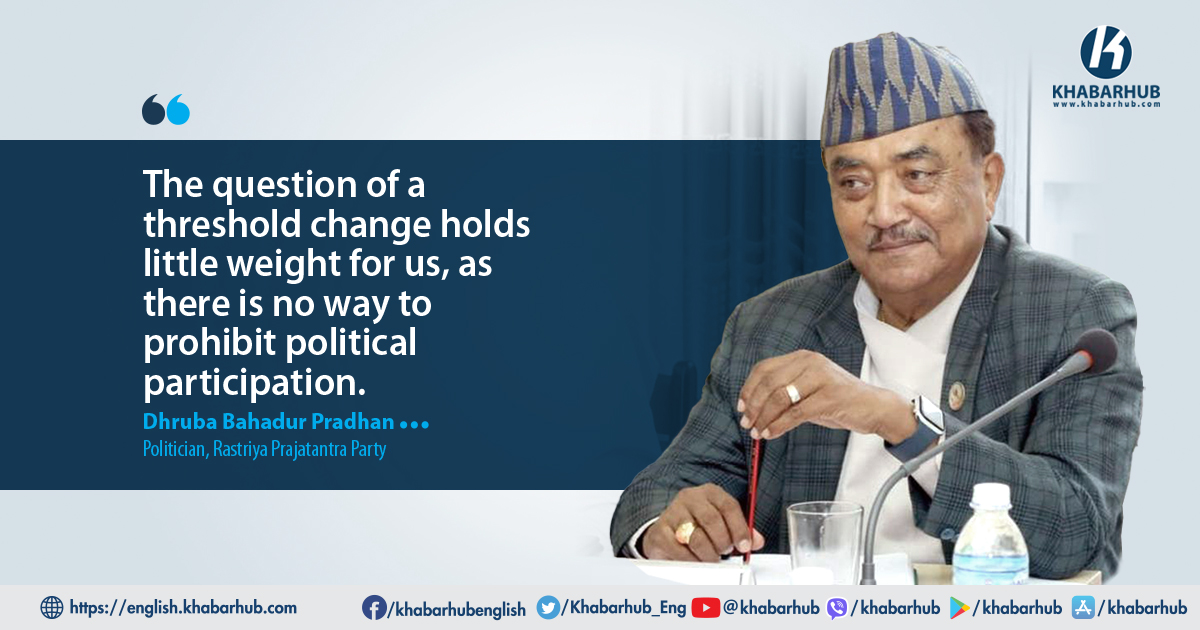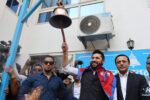KATHMANDU: The government is currently active under the coalition of Nepali Congress and CPN-UML, with claims that the activities of smaller parties in power politics have increased.
There is also ongoing speculation that they are strategizing to raise the threshold limit in order to dilute the representation of smaller parties.
Aware of the potential marginalization, smaller parties are planning to unite and counteract this shift.
During the elections, fragmented Madhesh-centric parties are attempting to unite in an effort to gain power.
Meanwhile, opposition parties like the Maoist Center, Unified Socialist, and others are vocal in their criticisms and claims of front-running.
It also appears that the royalist faction has found a home within the Rastriya Prajatantra Party (RPP).
Below is an edited excerpt from a conversation between Khabarhub and Dhruba Bahadur Pradhan, a member of the House of Representatives, discussing issues related to lawmaking, unity among nationalist forces, and the working style of the government.
There has been talk of introducing a threshold to restrict the activities of small parties, with the aim of limiting their role in national politics. The question arises: what event prompted the decision to set the threshold at 5 percent of the votes cast?
Regarding the threshold, the major parties have not included all nationally recognized parties in the discussion.
Since no decision has been made on this matter yet, whether the threshold is increased or decreased doesn’t hold much significance.
The Parliament and the Speaker, who are responsible for maintaining the integrity and recognition of the House, have remained silent on this issue.
There has been no meeting of the nationally recognized parties, and the government has failed to consult on any issue of national consensus. Even though the current government holds about two-thirds of the votes, its actions have shown little regard for the importance of consulting or making decisions collectively.
The question of a threshold change holds little weight for us, as there is no way to prohibit political participation.
As we move forward as a nationalist force, the public’s support for nationalist slogans and their expressed desires are clear.
At a time when the so-called major political parties are becoming increasingly unpopular, nationalist forces are gaining momentum. No matter how much the threshold is raised, it will not affect us.
You consider yourselves supporters of a middle-of-the-road system of governance that includes both the monarchy and the Maoists. A series of struggles, with a 40-point agenda demanding the abolition of federalism, a Hindu nation, and the restoration of the monarchy, are ongoing. The constitution does not recognize your agenda. What will you do if your voice is banned in Parliament?
There is no question of banning it in Parliament. Political parties are not banned; it’s about national recognition.
Even a party with just one representative in the House has the right to voice its opinion. This is not politics of prohibition. We are not disturbed by this issue.
However, unity is inevitable. The push for unity is not solely due to the threshold debate. It’s also driven by the government’s behavior—especially the forceful actions of the larger parties—and the growing discussion around representing Madhesh and nationalist parties.
This is a spontaneous reaction against the current political dynamics.
Increasing the threshold limit for national parties raises questions about proportional vote depreciation. What happens to the value of votes if a party fails to meet the 5 percent threshold and is not recognized as a national party?
This is a strategic issue, involving amendments to the Act and the Constitution. These are political matters we have raised vigorously in recent days, after submitting a memorandum.
These issues are of public concern, and there is a clear basis to move them forward as part of our agenda.
It’s been a long time since you submitted the memorandum. Have you been struggling at various stages? What progress has been made regarding the 40-point demand?
Due to frequent changes in government and violations of parliamentary dignity, our issues have not been addressed. Nevertheless, we are continuing to push for progress.
After RPP Chairman Rajendra Lingden met Nepali Congress President Sher Bahadur Deuba at his residence, there is suspicion that the RPP is not an alternative to the current coalition. Was there anything secret about that meeting?
As a democratic party, we see ourselves as an alternative. The political dialogue is based on courtesy and timely meetings.
Regarding preparations, it’s not that the government should be unaware of our parliamentary exercises.
As a party, we have taken a stance: we will not participate in the government until we are convinced that it will address the people’s problems and move forward with a strong commitment to national values.
The meeting was simply a formal exchange of views, where the RPP chairman shared his assessment of the current situation in the country, and the discussions centered on the current political climate.
If this meeting is interpreted as a counter to KP Oli, how appropriate is it?
We are not far from the current Prime Minister. We have not discussed taking the lead in solving the people’s problems.
The focus has been on amending the constitution. It is not that the issues we have raised should necessarily be resolved as a priority, but turning away from these issues and focusing on other matters after discussing the formation of a government tomorrow only discredits the situation, both nationally and internationally.
What is the possibility of unity within the RPP, given the competition where each leader does not recognize the other?
In politics, nothing is impossible. However, there is a situation where the nationalist party should move forward as one.
The party did not split at that time intentionally. Our former chairman failed to maintain continuity and tried to form another party and move forward.
But from all sides, it must have been realized that nothing can be achieved through excessive division.
Therefore, it is a shared sentiment that we should move forward as one. However, it’s not possible to say when this will happen, as we have not yet discussed it as a party issue.
Do you feel that the path has been lost, that we have gone beyond what is necessary?
Yes, when that feeling arises, and it is said that we must move forward now, it is no longer possible to come together simply because we were former party presidents.
There are also other nationalist forces. The RPP has not accepted a significant objection to uniting with them. Our door to dialogue is always open.









Comment